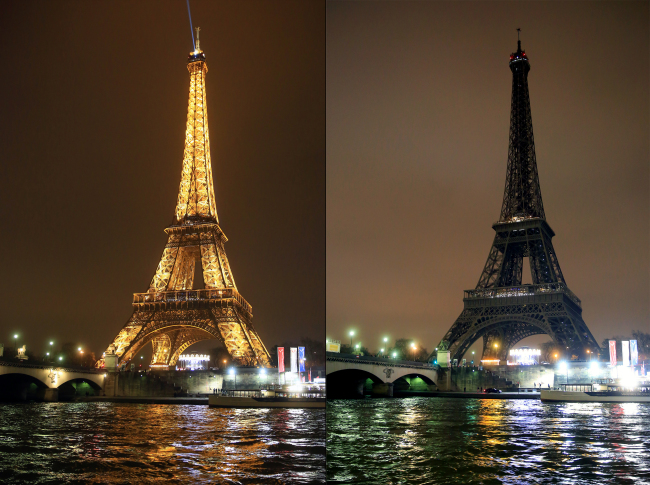From Sydney‘s Opera House to New York’s Empire State Building and Paris‘s Eiffel tower, landmarks worldwide dimmed their lights Saturday for the 10th edition of the Earth Hour campaign against climate change.
Millions of people from 178 countries and territories were expected to take part in WWF’s Earth Hour this year, organizers said, with monuments and buildings such as Berlin‘s Brandenburg Gate plunging into darkness for 60 minutes from 8:30 pm local time.
The annual event kicked off in Sydney, where the Earth Hour idea originated in 2007.
“We just saw the Sydney Harbor Bridge switch its lights off… and buildings around as well,” Earth Hour’s Australia manager Sam Webb told AFP from The Rocks area.
Earth Hour‘s global executive director Siddarth Das said organizers were excited about how much the movement had grown since it began nine years ago.
 |
| Combined photo shows the Eiffel Tower before (right) and after turning off lights for the annual Earth Hour event in Paris, France, Saturday. (Xinhua-Yonhap) |
“From one city it has now grown to over 178 countries and territories and over 7,000 cities, so we couldn’t be happier about how millions of people across the world are coming together for climate action,” he told AFP from Singapore ahead of the lights out.
Over 150 buildings in Singapore dimmed their lights, while Taipei‘s 101 skyscraper gradually turned lights off for one hour and the city’s four historical gates and bridges also went dark.
The lights also dimmed across Hong Kong‘s usually glittering skyline, although online commentators pointed out that China’s People‘s Liberation Army garrison headquarters on the harbor front kept the lights blazing.
“Imagine being the manager of the only building in a major metropolis to forget,” said one Twitter post alongside a picture of the PLA building lit up against a darkened skyline.
After Asia, Earth Hour shifted to Europe where St Peter’s Basilica, Rome‘s Trevi Fountain and the Parthenon temple in Athens were among a slew of iconic sites to go off-grid.
In London, the lights were shut off at the Houses of Parliament, the London Eye, Tower Bridge, St Paul’s Cathedral, Buckingham Palace and Harrods department store.
In Paris, the Eiffel Tower was plunged into darkness, as was the Kremlin in Moscow.
When New York‘s Empire State Building went dark, one New Yorker joked on Twitter “I was wondering why my skyline is black.”
In Chile’s capital, Santiago, the La Moneda presidential palace cut off its lighting for an hour, while in Mexico, the capital city‘s Monument to the Revolution went dark as well.
Meanwhile Canadian Prime Minister Justin Trudeau tweeted a cozy photo of himself and his wife, illuminated only by candlelight, with a fireplace glowing in the background.
“We’re all on this planet together. During #EarthHour and every day thereafter,” he wrote.
Earth Hour‘s Das said momentum towards climate action was building in the wake of the global climate talks in Paris last year.
The so-called Paris Agreement sets the goal of limiting global warming to “well below” two degrees Celsius (3.6 degrees Fahrenheit) over pre-industrial levels, with a more ambitious target of 1.5 C if possible.
Das said people were experiencing the impact of climate change more now than when Earth Hour began, adding that “climate change has now become a more personal topic”.
“I feel that there’s a renewed vigor among individuals and governments to come together for strong climate action and to fight climate change,” he said.
Das said Earth Hour organizers did not collect global statistics on the energy conserved during the 60-minute blackout, and that the event has always had symbolic intent, saying it was more a moment of global solidarity about a global problem. (AFP)

